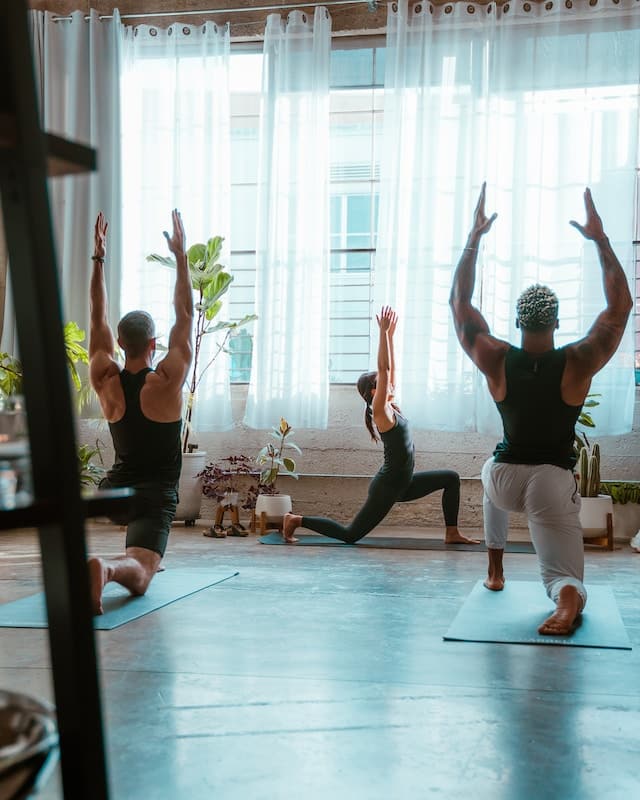Yoga, a practice grounded in mindfulness, tranquility, and balance, extends beyond the hour-long classes you might attend at a local studio. For many, it’s a lifestyle that spans into every facet of daily living, from the meals you cook in your kitchen to the time you spend meditating in a serene corner of your home. This article aims to guide you through the process of crafting your very own home yoga studio, where every element, from the lighting to the furniture, fosters a sense of calm, concentration and serenity.
Choosing the Ideal Space
The first step in creating a home yoga studio is selecting the most appropriate room in your house. It might be a quiet corner of your bedroom, an underutilized outdoor space, or even a dedicated room of its own. The goal is to find a space that resonates with tranquility and inspires you to deepen your practice.
Cela peut vous intéresser : Home canning and preserving: a beginner’s guide
Choosing the ideal space depends on a number of factors, including the size of your home and your personal preferences. If you live in a small apartment, for example, you might opt to convert a portion of your living room or bedroom into your yoga sanctuary. If you have more space to work with, you might dedicate an entire room to your practice.
1. Indoor vs. Outdoor
The decision between an indoor and outdoor studio depends on your personal preference and climatic conditions. An outdoor studio could be a wonderful choice if you live in a region with pleasant weather year-round. Practicing yoga outdoors connects you with nature, offering an invigorating experience.
A lire aussi : Hidden storage solutions: clever ways to declutter
On the other hand, an indoor space allows for more control over the environment, especially in terms of temperature, noise and lighting.
2. Size
The size of your studio will depend on the space available in your home and the types of yoga you plan to practice. Even a small corner can serve as a peaceful yoga sanctuary with the right design and decor.
Designing Your Yoga Studio
Once you’ve chosen the space, designing your yoga studio is the next step. Consideration should be given to factors such as lighting, wall color, and furniture placement. The goal is to create an environment that is conducive to concentration and relaxation.
3. Lighting
Proper lighting is essential in creating a tranquil ambiance for a yoga studio. Natural light is often the best option, but it’s not always possible, especially for indoor spaces or those who prefer to practice in the early morning or late evening. In this case, opt for soft, adjustable artificial lighting that mimics the warm glow of the sun.
4. Wall Color
The color of your walls can greatly affect your mood and focus. Soothing, neutral tones such as whites, beiges, and light blues are often recommended for yoga studios. These colors help to promote a sense of tranquility and focus, assisting in your yoga practice.
Furnishing Your Studio
Beyond the physical space, the furniture and accessories you choose for your yoga studio play an integral role in setting the stage for your practice. From yoga mats to meditation cushions, these elements all contribute to your comfort and ability to focus.
5. Essential Equipment
Basic yoga equipment includes a yoga mat, blocks, and straps. Depending on your practice, you might also want to consider a meditation cushion or bolster. It’s always best to choose quality yoga equipment that offers good support and durability.
6. Storage Solutions
Storage solutions are another key element in creating a clutter-free, serene yoga space. Consider options such as wall-mounted racks for mats, baskets for props, and shelves for books or candles. Having a specific place for everything helps to maintain order and cleanliness in your home yoga studio.
Creating a Peaceful Environment
Finally, you’ll want to add personal touches that make your yoga studio feel like a sanctuary. This could be a specific scent you love, a favorite piece of artwork, or a vision board filled with images that inspire your practice.
7. Decor
Adding personal decor helps to make your home yoga studio truly your own. Consider wall hangings with symbols that resonate with you, indoor plants to enhance the sense of tranquility, or candles to create a warm and inviting ambiance.
8. Sound & Scent
Sound and scent are two other powerful ways to enhance your yoga practice. Consider investing in a sound system to play calming music or nature sounds. Similarly, essential oil diffusers can fill your yoga studio with soothing scents that promote relaxation and focus.
Overall, creating a home yoga studio requires careful consideration of space, design, and decor. It’s all about crafting a space that supports your practice and nurtures your wellbeing. By incorporating the tips and ideas outlined in this article, you can create a home yoga studio that reflects your personality and meets your wellness needs.
Design Elements for Your Home Yoga Studio
In addition to the practical aspects of setting up your home yoga studio, paying attention to the design elements can transform your yoga space into a meaningful sanctuary. It’s all about creating a haven that not only serves your physical yoga practice, but also nourishes your mental and emotional well-being. As you would do with any room decor or home improvement project, consider factors like interior design, natural light, and your yoga mat’s color and texture.
9. Interior Design
The interior design of your home yoga studio can be a reflection of your personality and your yoga practice. Whether you prefer a minimalist design with just a yoga mat and a few essential props or a more elaborate setup with various textures and patterns, the choice is yours. You can also incorporate elements of your favorite yoga website or studio. Remember, the space should inspire and motivate you to practice and not contribute to any distraction or stress.
10. Natural Light
Natural light is a key component of any yoga space. It offers numerous health benefits, including boosting mood, improving sleep, and supporting Vitamin D synthesis. But more than that, the quality of natural light in your home yoga studio can significantly impact the ambiance of the space. If your chosen room has large windows, consider using sheer curtains to filter the light. For windows facing the sun, you could install blinds to control the light intensity. If your chosen space lacks natural light, consider installing skylights or using artificial lights that mimic natural light.
Conclusion: Embrace Serenity in Your Own Sanctuary
Crafting your own home yoga studio is more than just a home improvement project. It’s about creating a sacred space where you can retreat from the daily hustle and bustle, connect with your inner self and cultivate serenity. From choosing the ideal room to selecting the perfect yoga mats, every decision contributes to making your yoga practice more enjoyable and rewarding.
Just remember, creating a home yoga studio doesn’t have to be a daunting task. Start with what you have and gradually build your dream yoga sanctuary. Whether it’s transforming a corner of your living room or dedicating an entire room for your yoga practice, the important thing is to create a space that resonates with your vibe and supports your yoga journey.
A home yoga studio is not just a room, but an extension of your identity and your commitment to wellness. So, pour your love, creativity, and mindfulness into designing your yoga space. After all, it’s not about having a picture-perfect studio that could grace the pages of a home decor magazine. It’s about creating a space that feels like home, where you can breathe, stretch, and find peace within. With time and care, your home yoga studio will become an essential part of your house, a home within a home, where you can always turn to for tranquility and self-reflection.






